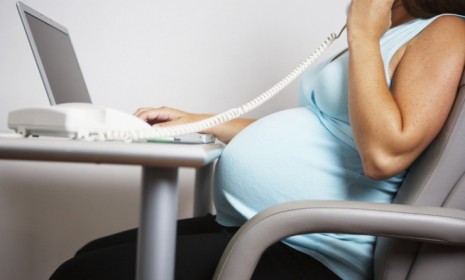Should pregnancy be labeled a disability?
An Ohio professor argues that expectant moms need legal protection so the strains of pregnancy don't cost them their jobs

A free daily email with the biggest news stories of the day – and the best features from TheWeek.com
You are now subscribed
Your newsletter sign-up was successful
Dizziness, weight gain, sleeplessness, aches, fatigue, nausea — those are just some of the uncomfortable issues that pregnant women deal with. And taken together, argues Jeanette Cox, an associate law professor at Ohio' s University of Dayton law school, these conditions are the rough equivalent of a minor disability. Cox contends that the feds should expand the Americans with Disabilities act to include pregnant women — and better protect their rights on the job. Is she right?
Absolutely: The Americans with Disabilities Act (ADA) already protects those "with minor temporary physical limitations comparable to pregnancy's physical effects," Cox tells the University of Dayton. But because pregnancy is not specifically protected by the ADA, millions of expectant mothers don't get the same legal rights as people with similar physical impairments do. Women sometimes lose their jobs because of pregnancy. For example, one retail worker was let go "because drinking water while working to maintain a healthy pregnancy violated store policy." The law must be changed to prevent such outrages.
The Week
Escape your echo chamber. Get the facts behind the news, plus analysis from multiple perspectives.

Sign up for The Week's Free Newsletters
From our morning news briefing to a weekly Good News Newsletter, get the best of The Week delivered directly to your inbox.
From our morning news briefing to a weekly Good News Newsletter, get the best of The Week delivered directly to your inbox.
No way: This idea, while "well-intentioned," would be "one hell of a slippery slope," says Linda Sharps at The Stir. "For most of us, pregnancy is a normal, healthy condition, not a disability." It's always nice to get a bit of special treatment during pregnancy — be it a seat on the subway or a good parking space — but it's hardly necessary. Let's just keep relying on the Pregnancy Discrimination Act to ensure that pregnant women are treated fairly at work. "Labeling every pregnancy as a physical impairment seems like the wrong thing to do."
"Pregnancy shouldn't be called a disability"
But it might be necessary: "Before you leap up in outrage at the idea that pregnant women might be considered disabled, think about what the legal protection would mean," says Sierra at Babble. Pregnant women do need to be accommodated on the job, from having adequate access to drinking water and sufficient bathroom breaks to sometimes being given a lighter load. Maybe Cox's solution isn't the perfect one. But make no mistake: "Working pregnant women often have a problem getting fair treatment from their employers." That must change.
A free daily email with the biggest news stories of the day – and the best features from TheWeek.com
-
 Why is the Trump administration talking about ‘Western civilization’?
Why is the Trump administration talking about ‘Western civilization’?Talking Points Rubio says Europe, US bonded by religion and ancestry
-
 Quentin Deranque: a student’s death energizes the French far right
Quentin Deranque: a student’s death energizes the French far rightIN THE SPOTLIGHT Reactions to the violent killing of an ultraconservative activist offer a glimpse at the culture wars roiling France ahead of next year’s elections
-
 Secured vs. unsecured loans: how do they differ and which is better?
Secured vs. unsecured loans: how do they differ and which is better?the explainer They are distinguished by the level of risk and the inclusion of collateral